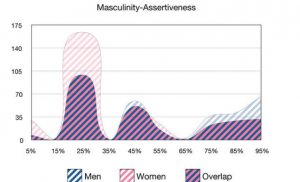gender: did we make it up?
‘Me Tarzan. You Jane.’
Men are assertive. Women are nurturers. Women scrapbook and men play videogames. Men want no-strings sex while women seek intimacy and love.
We have defined the difference between the sexes for centuries by grouping behaviour into masculine or feminine categories, believing that’s just the way it is. We’re made that way. There’s an unspoken idea that each one of us is biologically inclined to act in a manner appropriate to our sex. And with this idea comes an implied message: if you don’t fit the mold, you’re not normal.
Western culture has historically been infatuated with the dichotomy of women innately acting one way and men the opposite (Jane is from Venus while Tarzan hails from Mars). But new research from the US seeks to dismantle this way of thinking. Men and Women are from earth reveals that it is not so simple.
According to the study, typical gendered behaviours such as an interest in science, feeling concern for people and watching pornography is exhibited by both sexes. The research, conducted by academics B. J. Carothers and H. T. Rein, discovered that while more men are assertive and more women show empathy, there is an overlap in characteristics between the sexes. Therefore no behaviour is purely enacted by men and no action belongs solely to the feminine.
‘Men and women,’ Carothers and Rein detail, ‘Do not exhibit all the attributes, interests, attitudes, roles and behaviours expected of their sex according to their society’s descriptive and prescriptive stereotypes, but only some of them.‘
The point of the study’s discussion is to demonstrate that masculine personality traits are not restricted to men, but are in fact qualities of a human being. We cannot be psychologically categorised into inherently male or female simply by how we act, thereby turning the Mars and Venus dualism on its head.
How does this change anything? I bet you know heaps of gamer girls and boys who like interior design and are really good at listening. So what? Me too!
It means that when we make judgements about someone’s sexuality because they’re not as masculine or feminine as we think they should be, we can challenge our own thoughts. Or when I’m at a picnic with some friends, and the mother of a boy complains that her son always gets grubby and crawls into mischief but his cousin is content to sit quietly in her pretty dress, and that it’s the difference between boys and girls, it means I can speak up. I can tell her studies show that psychologically, men and women aren’t really that distinct and maybe, just maybe, if you keep saying things like that then you’ll tell little boys and girls exactly how to act.
How have cultural expectations shaped our own behaviour? Now that we know that femininity and masculinity are more loosely defined than watertight genetic-based reasoning, we can no longer place gender in a box.
As Amanda Marcotte from Salon wrote, ‘We’re constantly being put in gender silos, and yet, apparently, we keep escaping.’ So while it’s expected (through TV sitcoms, snide comments, Hollywood movies, and our own parents) that Tarzan always leaps to rescue his damsel in distress, we know the truth. That there’s nothing that stops Jane fighting lions.



It’s probably worth remembering though that of all the things the social sciences study, one of the largest areas of interest has to have been the differences and similarities between the sexes. For every study (like Men and Women are from earth) showing similarities between men and women – I’m sure there are heaps – there are probably heaps more that show the opposite! This is a very ideologically-contested field. One reason being that every time a new study is performed, a newspaper or television station or – *ahem* – website picks up the story and gives the study publicity. It’s nice to get attention! Money usually follows…. !
Another thing occurred to me when reading this – the list of cliches about differences between the sexes that begins the article is very modern. A century ago it would have been impossible to come up with such a list, and in fact some of the differences listed here would have been thought obscene and absurd at the time (ie, men want no-strings sex/women want intimacy and love). Because of moral thought at the time that difference would never have been expressed in that manner. My point is this – that in thinking about and expressing the supposed differences between the sexes, our responses are inevitably very culturally-based, and perhaps if the 20th century/21st cliches about these differences are wrong, the 19th/18th/17th century cliches have yet to be tested. If we got it wrong, maybe – just maybe – someone at another time, in another place, has got it right.
“‘Men and women,’ Carothers and Rein detail, ‘Do not exhibit all the attributes, interests, attitudes, roles and behaviours expected of their sex according to their society’s descriptive and prescriptive stereotypes, but only some of them.‘”
It seems pretty clear the authors aren’t claiming that gender is made up.
“I can tell her studies show that psychologically, men and women aren’t really that distinct”
But where do you draw the line? How distinct? What’s interchangeable between sexes? what isn’t? How does the study inform these questions?